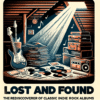The Cross-Genre Evolution of Indie Rock: Blurring the Lines of Musical Identity

Indie rock, originally defined by its DIY approach and distinct sound, has undergone a remarkable evolution in recent decades. Today, the genre features intricate blends of sounds and influences from various musical realms. This article will explore how indie rock has transformed through cross-genre experimentation, deconstructing the factors that contribute to its current state and the importance of these shifts in defining contemporary musical identity.
The Origins of Indie Rock
Indie rock emerged in the 1980s as a response to mainstream pop and rock music. It was characterized by bands that took control of their production and distribution, often releasing their music on independent labels. Pioneers like The Smiths, R.E.M., and Sonic Youth laid down the groundwork, creating a sound that was less polished than mainstream rock, allowing for more personal expression and lyrical depth.
In the 1990s, the genre gained traction, particularly with the rise of grunge bands such as Nirvana and Soundgarden. These acts simultaneously challenged the polished aesthetics of popular rock while intertwining elements of punk and alternative music. The success of these bands encouraged a wave of indie musicians to take creative risks, fostering a more eclectic and varied sound that continues to inform indie rock today.
Cross-Genre Influences
Blending with Electronic Music
As technology advanced, indie rock began to embrace electronic elements, leading to the rise of subgenres like synth-pop and chillwave. Bands like Passion Pit and MGMT incorporated wavering synth lines, drum machines, and ambient soundscapes into their music, creating vibrant sonic textures that blurred the lines between rock and electronic music. This cross-pollination allowed indie rock to attract new audiences and expand its reach internationally.
See Also: How Classic Rock Bands Navigated the Changing Music Landscape
How Classic Rock Bands Navigated the Changing Music LandscapeIncorporation of Hip-Hop
The influence of hip-hop on indie rock has been profound, with artists like Death Grips and Groundislava pushing the boundaries of genre definition. Their works incorporate aggressive beats, spoken word verses, and innovative sampling, demonstrating how indie rock can coexist with urban and avant-garde sounds. Similarly, bands like Vampire Weekend have been noted for combining African music influences with traditional rock instrumentation, further illustrating the genre's evolution.
Folk and Americana: The Acoustic Interlude
The acoustic resurgence within indie rock draws upon elements of folk and Americana. Artists such as Fleet Foxes and Bon Iver have infused storytelling, rich harmonies, and organic instrumentation into their sound. The poignant lyrics and emotive melodies create a juxtaposition against the electronic and pop influences, offering a space for introspection while reinforcing indie rock's diverse identity.
Punk’s Enduring Legacy
Punk rock’s lasting influence is also significant in the indie rock landscape. Recent bands like FIDLAR and PUP celebrate a mix of raw energy and self-awareness, exemplifying the high-octane sound of punk. By integrating punk elements into their music, these bands keep the spirit of rebellion alive, while highlighting the genre's ability to adapt and thrive in a shifting musical landscape.
The emergence of streaming services has amplified the cross-genre evolution of indie rock. Artists can now gain exposure without the traditional barriers of entry, allowing them to experiment freely across genres. Platforms like Spotify, SoundCloud, and Bandcamp have democratized music distribution, enabling emerging artists to reach listeners worldwide without the need for major label support.
See Also: Festival Fever: The Indie Rock Festivals You Can’t Miss This Year
Festival Fever: The Indie Rock Festivals You Can’t Miss This YearSocial media plays an equally critical role in this transformation, facilitating connectivity between artists and fans. Platforms like Instagram and TikTok allow musicians to showcase their influences, engage with their audience, and approach music in innovative ways. As a result, artists can borrow from a diverse range of styles without fear of being pigeonholed and can cultivate a unique sound reflective of their multifaceted identities.
The Importance of Cross-Genre Evolution
Redefining Musical Identity
The blurring of boundaries in indie rock is not only relevant to the artists themselves; it reshapes how listeners interact with music. Contemporary audiences no longer adhere strictly to genre labels. Instead, they seek authenticity and originality, gravitating towards music that resonates with their personal experiences, irrespective of classification. This paradigm shift has pivoted both artists and audiences towards a more inclusive and fluid approach to music appreciation.
Encouraging Creativity and Collaboration
This cross-genre evolution fosters a landscape where artistic boundaries are constantly challenged and redefined. Musicians are encouraged to collaborate across styles, resulting in innovative projects that blend different worlds. Such artistic freedom allows for a dynamic exchange of ideas and practices, prompting fresh explorations of sound and expression.
The Global Influence of Indie Rock
The global nature of today’s music scene is evidenced in the myriad of influences present in modern indie rock. Artists around the world infuse their native sounds into their music, further diversifying what indie rock embodies. From Latin American rhythms to Afrobeat grooves, the genre reflects a rich tapestry of cultural narratives, providing a platform for underrepresented voices in the music industry.
See Also: Lost and Found: The Rediscovery of Classic Indie Rock Albums
Lost and Found: The Rediscovery of Classic Indie Rock AlbumsConclusion
The cross-genre evolution of indie rock has been integral in forging a more inclusive, dynamic, and innovative musical identity. As artists continue to explore and experiment with various influences, the genre becomes a canvas that reflects the complexities of human experience. This era of indie rock invites listeners to embrace musical diversity, highlighting the beauty of artistic expression in a world that increasingly thrives on interconnectedness and authenticity.
FAQs
1. What defines indie rock today?
Indie rock today is characterized by its genre-blending tendencies, wide-ranging influences, and emphasis on artistic autonomy. Artists draw inspiration from rock, pop, folk, electronic, punk, and hip-hop to create unique sounds that defy simple categorization.
2. How has technology influenced indie rock?
The rise of streaming platforms and social media has democratized music distribution, allowing indie artists to experiment beyond traditional boundaries. It provides them with a global audience and collaborative opportunities across genres.
3. Are there notable examples of cross-genre indie rock artists?
Yes, examples include Vampire Weekend (combining rock with Afrobeat influences), MGMT (integrating psychedelic and electronic music), and Bon Iver (fusing folk with experimental elements).
4. How does the future look for indie rock?
The future of indie rock appears vibrant, with continued exploration of diverse influences, storytelling, and innovative collaboration. As boundaries continue to blur, the genre will likely evolve further, shaping and reflecting the ever-changing cultural landscape.
 The DIY Revolution: How Indie Rock Artists are Taking Control of Their Careers
The DIY Revolution: How Indie Rock Artists are Taking Control of Their CareersIf you want to know other articles similar to The Cross-Genre Evolution of Indie Rock: Blurring the Lines of Musical Identity you can visit the category Rock.
